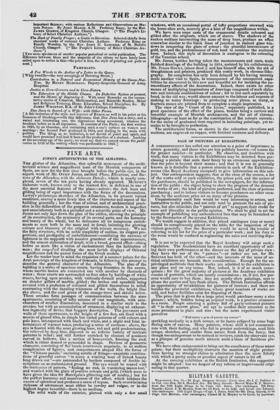SALE OF PICTURES AT EXHIBITIONS.
A CORRESPONDENT has called our attention to a point of importance to artists generally, and those who are less publicly known—of course the far greater number—in particular. He observes, and doubtless with truth, that many visiters to the Exhibitions may be deterred from pur- chasing a picture that suits their fancy by an erroneous apprehension that the price is beyond their means ; and that it is not so generally known as is desirable that a person attends in each of the Exhibition- rooms (the Royal Academy excepted) to give information on this sub- ject. Our correspondent suggests, that at the close of the season, a list of the works sold et each exhibition, the prices paid, and the names of the purchasers, should be published in the newspapers, for the informa- tion of the public : the object being to show the progress of the demand for works of art ; the kind of pictures preferred, and the class of persons purchasing ; and to induce visiters to become purchasers on other occa- sions, by the moderate price set on many of the pictures. Unquestionably such lists would be very interesting to artists, and instructive to the public, and not only tend to promote the sale of pic- tures, but also stimulate the " patrons of art " to support their credit for taste and liberality in the public opinion. We shall be glad to set the example of publishing any authenticated lists that may be furnished us by the Secretaries of the several Exhibitions.
We would suggest in addition, that priced catalogues (one or more) should be conspicuously placed on the table, for the inspection of the visiters generally : thus the Secretary would be saved the trouble of referring to his list for the price of a particular work ; and his duty in the room would be confined to registering the sales and receiving depo- sits.
It is not to be expected that the Royal Academy will adopt such a regulation. The Academicians have an excellent opportunity of sell- ing their own performances at the dinner on the day of private view : they have the ear of the " patrons "—or rather one ear, for Mr. &OUTER has hold of the other—and the interests of the mass of un- titled exhibiters are beneath their consideration. Enough for the un- privileged multitude that their works are admitted to the exhibition in any place and on any terms. Nor, indeed, is it of so much conse- quence; for the great majority of pictures at the Academy exhibition consist of portraits, which are mostly commissions ; or, if not, few per- sons would care to buy them : they are mostly show paintings, sent to please the parties and lure fresh sitters. The British Institution affords an opportunity of rei.!xhibition for pictures of interest ; and there are besides the provincial exhibitions, where great numbers of works are sold, and better facilities exist for disposing of them.
The price that is given for a large print would purchase many a nice
picture; which, besides being an original work, is a prettier ornament to a room. People entering a gallery full of gayly-coloured pictures all "in their newest gloss," are apt to confine their attention to the more prominent in place and size but the snore experienced visiter perceives
"Full many a gem of purest ray serene"
sparkling modestly in a dark corner, or its lustre eclipsed by sonic huge flaring acre of canvas. Many painters, whose skill is not commensu- rate with their feeling, and who fail in greater undertakings, send little scraps, sketches, and studies from nature fresh from the fancy, that though too unimportant to be noticed in reviews, catch the observant eye, as a glimpse of genuine merit attracts amid a blaze of factitious pre- tension.
We have often endeavoured to bring out the excellences of these minor points : but their multiplicity obstructs the mention of slight produc- tions having no stronger claims to admiration than the mere felicity with which a pretty scene or peculiar aspect of nature is hit off.
At the ensuing exhibition at the British Institution, this suggestion might be adopted : but we despair of any reform or improvement origi- nating in that quarter.


























 Previous page
Previous page